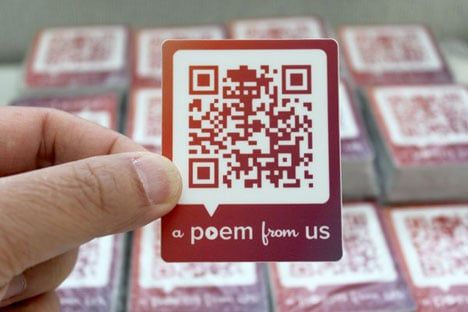
Call me weird, but... I actually like QR codes.
I like what they represent, what they could be. I like QR codes just fine - what I hate about them is the way they're usually implemented.
Most days, as I'm going to and from work, I'll see a handful of QR codes slapped onto posters or billboards like an afterthought. Sometimes I see them on posters at El stops, nestled underground far away from any kind of signal or WiFi connection. Sometimes, inside a train car, the QR codes are so small and far away, I'd have to climb over my fellow passengers to get close enough to scan it.
Once, I even saw a QR code adorning an ad on the side of a bus.
On top of all that, when I do get around to scanning a QR code... oftentimes the payoff isn't worth the effort. QR codes generally lead to a basic URL that could have been better conveyed through text, and might have saved the user a lot of time.
The magic of QR codes for me is that they imply something unseen, something unknown. They suggest some kind of surprise. There's a curtain waiting to be peered behind, something just around the corner. It's this inherent promise that I like about QR codes. And from what I've seen, I feel like we're letting consumers down.
There are a handful of QR code campaigns that I find really interesting. Victor Petit created an incredibly unique personal resume, utilizing a photograph of himself and a QR code. Last year, during the holiday season, JC Penney added the ability for people to send along a personalized, recorded message with their gifts.
And my favorite QR code project of all? That would be QRadio by the street artist Sweza - an image of a boombox where, when you scan the QR code, transforms your mobile device into a cassette tape and plays a track for you.
These kinds of "surprises" were on my mind, when I was trying to figure out how I might go about utilizing QR codes for a campaign of my own. I've long been interested in playing with ways that literature and multimedia can be combined. In April, to help celebrate National Poetry Month, I launched a project that aimed to combine poetry and QR codes: A Poem From Us.
Made possible through a generous grant from the Chicago Awesome Foundation, A Poem From Us is a website featuring regular people, reading their favorite poems. The project's goal is a simple one: use technology to help folks share their love of poetry with others.
People are invited to participate in one of two ways.
Online, visitors can record themselves reading a favorite poem and submit the video to the website.
Offline, they can request a set of free stickers which feature the project logo and a custom QR code. When these stickers are scanned by passers-by, a random video from the project website will play on the user's mobile device. Think of it as a kind of "found poem" for the digital age.
As the project grows, the stickers will grow with them. As more poems are added, different videos become available - allowing what happens online to change and influence what happens offline.
To me a good poem, a strong poem, takes you out of your everyday - it catches you off guard, and reshapes the world, slightly. With the project and QR code stickers, I like the idea that there are these little opportunities out there. These stickers serve as a small moment where someone, out of curiosity, may be introduced to a poem they didn't know.
In scanning the QR code, they're not given a coupon to redeem, they're not sent to some form to fill out. They're given a video of another person, reading a poem they really love and that they really wanted to share.
What could be more surprising than that?
---------
Felix Jung lives and works in Chicago, where he lives with his wife and two rabbits: Baxter and Professor Snugglesworth. He maintains a personal blog at avoision.com.
A Poem From Us was realized through a generous grant from the Chicago Awesome Foundation (an organization that gives micro-grants of $1,000 each month, to projects they deem awesome). Visit awesomefoundation.org for more information.




